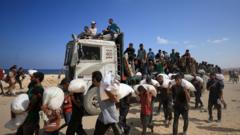On Saturday, at least 32 Palestinians were reported killed and many injured by Israeli forces near aid distribution sites in southern Gaza, according to the Hamas-run health ministry. This incident highlights the severe humanitarian situation as aid contractors renew fears over safety in the region.
Fatal Clashes Erupt Near Gaza Aid Distribution Points Amid Ongoing Conflict

Fatal Clashes Erupt Near Gaza Aid Distribution Points Amid Ongoing Conflict
A recent incident involving Israeli gunfire in southern Gaza has resulted in numerous Palestinian casualties, raising alarms amidst the ongoing humanitarian crisis.
At least 32 Palestinians seeking food have been killed by Israeli gunfire near two aid distribution points close to Khan Younis and Rafah in southern Gaza, according to the territory's Hamas-run health ministry. Dozens were also injured near the two sites managed by the US and Israeli-supported Gaza Humanitarian Foundation (GHF), the ministry reported.
The GHF denied any incidents occurred "at or near" their aid sites but acknowledged that "Israel Defense Forces (IDF) activity" had taken place hours before the scheduled opening of the sites. Eyewitness accounts reported that Israeli gunfire appeared "targeted to kill," contributing to the escalating tensions.
An aid contractor who spoke to BBC claimed to have witnessed colleagues firing at desperate Palestinians. For several weeks now, reports have surfaced of Palestinians being shot while attempting to access aid since the GHF commenced operations in late May. Witnesses have primarily attributed the gunfire to Israeli forces.
In the most recent incident, the IDF stated that troops had fired warning shots to deter "suspects" from approaching, asserting that the gunfire occurred before aid distribution commenced. Mohammed Al-Khalidi, a witness, accused the Israeli military of deliberately targeting individuals, suggesting that the intent was not to disperse the crowd but to inflict harm.
The GHF utilizes private security contractors to facilitate the distribution of aid within Israeli military zones, a measure defended by Israel and the US as necessary to prevent Hamas from misappropriating aid supplies. The UN has refused to collaborate with this system, labeling it unethical and demanding evidence of widespread Hamas involvement in misallocating aid.
On 15 July, the UN human rights office reported 674 deaths near the GHF's sites over the past six weeks. Moreover, they documented an alarming 201 deaths occurring along routes that UN and other aid convoys traversed. The GHF challenged these figures, labeling the claims as "false and misleading" and expressing skepticism about the reliability of data from Gaza's Hamas-led health ministry.
Meanwhile, Israel has barred international media, including the BBC, from accessing the territory. The UN reported that the number of acutely malnourished children has doubled since Israel imposed tight restrictions on food entering Gaza in March. Consequently, despite the establishment of the GHF, many essential supplies, including baby formula, remain blocked at the border.
Recent statements from a field hospital director highlight an influx of patients suffering from severe exhaustion and malnutrition, with the Hamas government media office noting that 69 children have died from malnutrition amidst the deepening humanitarian crisis.
On the diplomatic front, US President Donald Trump claimed that a ceasefire agreement was nearing, although a Palestinian official later informed the BBC that negotiations remained stalled, particularly concerning an unacceptable troop withdrawal proposal put forth by Israel. As tensions mount, the Gaza aid situation continues to reflect a landscape marred by violence, despair, and chaos.




















